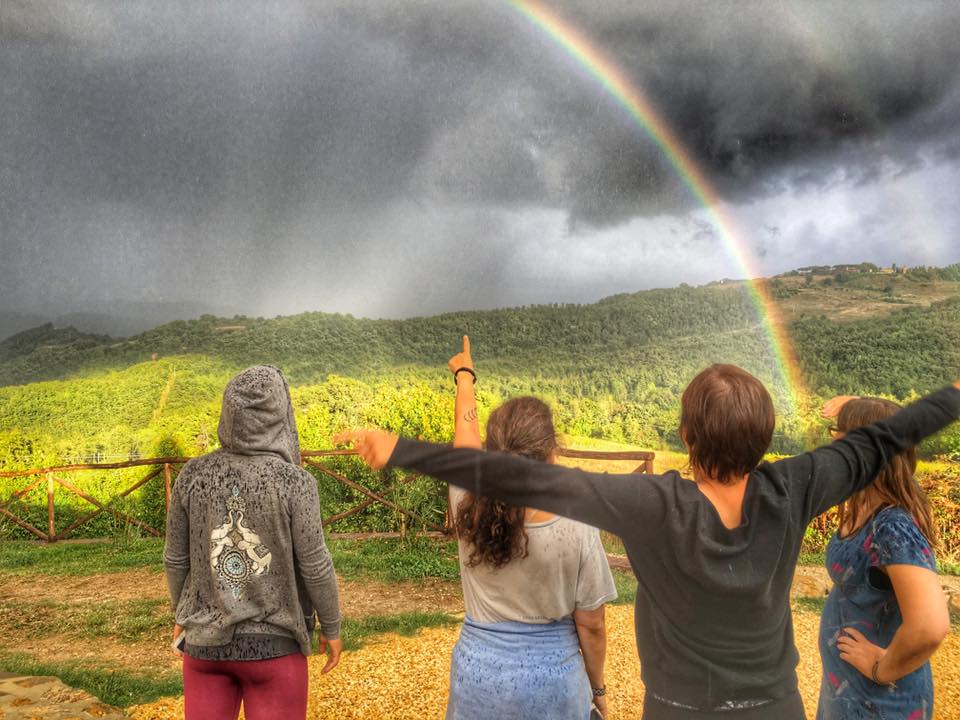“Do they make noise when you walk?” my 16-year old daughter stands next to me in the shoe store. She and her sister are my fashion experts. I never buy a pair of boots or a purse without consulting them first. I laugh out loud, not because it sounds like a ridiculous question, but because I completely identify with it. In that instant, an image of my two girls playing dress-up as toddlers fuzzes into my mind. Their arms filled with tulle and satin, they ferried outfits from the carpeted playroom to the hardwood floor of the kitchen, emptying the dress-up box trip by trip because that was where the plastic princess shoes made a really satisfying clop, clop, clop.
“Children should be seen and not heard,” was a phrase often repeated in my childhood home, except it seemed as though the boys were somehow exempt. They were encouraged to rough-house and wrestle, yelp wildly through a game of Cowboys & Indians, holler affirmations and pump their fists in the air when they won a game of H-O-R-S-E. The girls were expected to sit quietly and color and if we made any sort of exuberant noise we were shushed post-haste.
By the time my mother and father divorced, I was well-versed in the expectations of silent servitude. My job was to anticipate what needed to be done and do it without protest or inquiry. I learned that chatterbox was decidedly NOT a compliment, that challenging house rules, even in a calm voice, would earn me a belt slash across the backside, and that my charm and value rose in direct proportion to how well I conformed and made peace between my siblings. I was a good middle child but also the oldest girl. When Dad left and Mom went back to work full time, I became the one doing the shushing, reminding my little sister Katy to raise her hand in class if she had a question, perfecting the laser eye that would still her lips at the dinner table, installing an inner monologue in her head designed to help her determine whether her input was important or necessary or if it was just noise.
When Katy and I were molested, I was silent. It wouldn’t do to upset the grownups. Mom had no choice but to pay this woman to watch us when she was at work. I knew she would rather be home with us and telling would only hurt her and make things worse for everyone. Instead of fighting, I began a months-long campaign to convince Mom that I was responsible enough to be in charge for a few hours after school until she got home. I didn’t yell, scream, argue, or debate. I learned to cook and clean. I showed her how much better it would be to come home from work to a hot meal and happy kids than to make us stay at the babysitter’s house.
My report cards reflected how strongly I embraced the notion that my best contributions came about when I listened instead of talking and did exactly what was expected of me. My teachers noted that I was a “team-player,” “silent and attentive in class.” I equated compliance with excellence.
—
After sending our daughter Erin to four years of Montessori school where she was encouraged to think independently and ask lots of questions, we decided it was time to enroll her in the local public elementary school. For weeks she came home agitated and upset, bored and frustrated. Most mornings, she begged me not to make her go back, but she couldn’t articulate exactly why. Six weeks into the school year, we had our first parent-teacher conference.
“Erin is an exemplary student. She is quiet in class, pays attention and turns her homework in on time. She doesn’t ask questions or move around. She just does what I ask her to. I wish they were all like that.”
Bile rose in my throat. This was an attempt to surgically remove my daughter’s belief that she could be an active participant in her own life and replace it with the notion of quiet compliance. The last thing I wanted my daughter to believe was that her most valuable assets came in the form of shutting up and sitting still. I wanted her to question, explore, push beyond the boundaries. I wanted her to express her ideas and opinions without worrying whether they were different, and if that meant they were wrong. I wanted her to find space for her voice and practice using it.
It was Dad’s second wife that taught me the power of my own voice. She was the one to whom I confessed my sordid little secrets. She was the one who took me to my first political rally. She was the first adult who made it a priority to listen to me instead of imploring me to be quiet. She helped me begin to see my own worth as something that came from inside me rather than something that was determined by other people.
It took me decades to break free of the idea that there were prescribed, acceptable ways for a young woman to make noise – on the basketball court or in a cheerful response to a man’s question. I absorbed messages from my own family as well as the confusing cultural signals about when women are allowed to speak up (but NEVER speak out), how to appropriately show emotion without going overboard or risking labels like ‘hysterical’ or ‘oversensitive.’ I learned which subjects were feminine. I can remember screaming into a pillow so that I wouldn’t bother Mom if she was upset or sleeping. I weighed each syllable I spoke carefully on my tongue before I released it, assessing purpose and premise and potential fallout. Even when I knew something needed to be said, I forced my tongue to the roof of my mouth and took deep breaths because it wasn’t my place, I hadn’t been invited, I shouldn’t rock the boat.
I swore I would raise my daughters differently.
—
Erin convinced me to buy the boots that made noise when I walk. She confessed that part of the reason she loves our house is because it has hardwood floors. She wears her heels all day long, walking purposefully from her room to her sister’s room, to the bathroom and down the stairs for dinner. Sometimes when I am in the middle of cooking or working, I stop and look up and smile, listening to the rhythm and cadence of my daughter making noise. Her younger sister doesn’t wear her shoes in the house, but she plays her guitar and sings loudly, not caring if the neighbors hear. Dinnertime is a tumble of words and opinions and laughter and sometimes, shouting. I have taught my girls that the only thing they need to weigh when they open their mouths to speak is whether what they are about to say is kind, not whether they have any right to speak at all.
On the morning of the first day of school, after the girls had left the house, I put on my sneakers and went for a walk. Instead of going along the paved road, I veered off onto a gravel path and listened to the sound of my feet crunching in the still, cool morning air. I love the sound of shoes on a gravel path. It is my reminder: I am here, I am here, I am here. I make noise, I have worth, I am here. I walked and said a silent prayer for my daughters and myself. May our words come clearly and easily. May we always remember to announce our presence with footsteps and sentences and laughter or outrage. May we always stand our ground and know our worth. We are here, we are here, we are here. We make noise. We have worth. We are here.


Gorgeous writing. I love how much transformation can happen in one generation. Glad your girls, and you, are making noise.
[…] ( Leave a comment ) Kari O’Driscoll’s piece, “When Girls Make Noise,” at The Manifest-Station caught my attention when I was busy with something else, almost as if it interrupted. I loved the […]